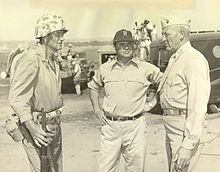You were our comrade
| Movie | |
|---|---|
| German title | You were our comrade too: Death squad too: Iwo Jima, the great battle |
| Original title | Sands of Iwo Jima |
| Country of production | United States |
| original language | English |
| Publishing year | 1949 |
| length | 100 minutes |
| Age rating | FSK 12 |
| Rod | |
| Director | Allan Dwan |
| script | Harry Brown , James Edward Grant |
| production | Edmund Grainger |
| music | Victor Young |
| camera | Reggie Lanning |
| cut | Richard L. Van Enger |
| occupation | |
| |
You were our comrade (original title: Sands of Iwo Jima ) is an American war film by the director Allan Dwan from 1949, whose historical background is the battle of the island of Iwojima in the Pacific War against Japan .
action
John Stryker is a sergeant in the US Marines and feared for being harsh with his subordinates. Recruits suffer from hard training. Two soldiers are having a particularly difficult time: Peter Conway, the snobbish, educated son of an officer under whom Stryker previously served and whom he admired, and Al Thomas, who blames him for his demotion.
During an exercise, a recruit detonates a live hand grenade and accidentally throws it in the wrong direction. Everyone present drops, except for Conway, who is reading a letter from his wife. Stryker throws him to the ground, saving his life, only to sniff at him immediately afterwards. When the group is deployed to land on Tarawa Island , all but Conway understand Stryker's rough approach. He considers him brutal and callous when he apparently leaves a wounded comrade behind.
During the attack, the soldier Thomas failed to get ammunition for two comrades in time because he had drunk coffee. As a result, he returns too late, killing one of the two Marines and seriously wounding the other by bayonet stabs from a Japanese soldier. When Stryker finds out, a fight breaks out between Thomas and Stryker. A supervisor charges Stryker with beating a subordinate. However, Thomas explains that Stryker wanted to teach him Jiu Jitsu and thereby saves him from punishment. Thomas cannot cope with his guilt for the death of his comrade, breaks down nervously and apologizes for his behavior.
During the following vacation vacation in Honolulu , Stryker shows his "soft" side. He follows a barmaid into her apartment and notices a noise in the next room. When he looks, he finds the barmaid there looking after her baby. He gives all of his money to the wife, a widow of a fallen marine, and leaves the apartment.
In the next battle, the landing on the island of Iwo Jima , Stryker's group erects the US flag on Mount Suribachi (see Raising the Flag on Iwo Jima ) . Shortly afterwards, Stryker is killed by a Japanese sniper during a break in the fight . A letter to his son is found at Stryker, in which he writes everything that he always wanted to tell him, but which never happened.
backgrounds
- The film was shot at Camp Pendleton (California) and on the beach on Santa Catalina Island.
- In one scene, Sgt. Stryker ( John Wayne ) instructs the recruit Prv. Choynski (Hal Baylor) how to march properly and hold the rifle. In real life, Baylor was an ex-marine who was involved in the fighting on Saipan and Tinian . In contrast, Wayne was never in the military himself.
criticism
- Lexicon of international film : "Heroic war drama with a dubious tendency and much-vaunted, perfectly staged battle scenes."
Awards
The film was nominated for an Oscar in 1950 in the categories of Best Original Story , Best Actor , Best Editing, and Best Sound . John Wayne received the Photoplay Award for Most Popular Male Star .
literature
- Patrick Vonderau: Death Squad / You were our comrade / Iwo Jima, the great battle . In: Film Genres. War Movie. Edited by Thomas Klein, Marcus Stiglegger and Bodo Traber. Stuttgart: Reclam 2006, pp. 87-92 [with references]. ISBN 978-3-15-018411-0 .
Web links
- Sands of Iwo Jima in the Internet Movie Database (English)
Individual evidence
- ↑ You were our comrade. In: Lexicon of International Films . Film service , accessed February 22, 2017 .
